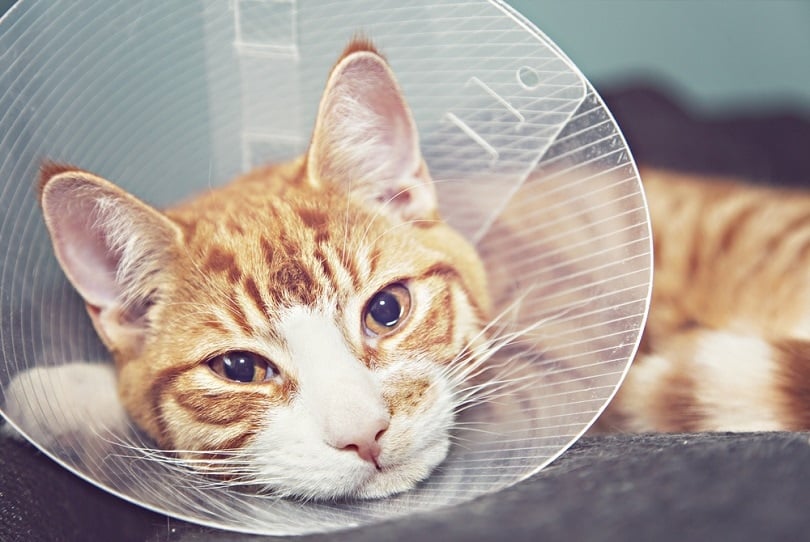Click to Skip Ahead
You may not immediately recognize the term “e-collar,” but you’ve definitely heard of them. You might know the e-collar by its more affectionately referred to term: the Cone of Shame. E-collars, or Elizabethan collars as they’re more officially known, is a protective medical device that cats or dogs wear around their necks. The purpose of the collar is to prevent the animal from scratching, biting, or licking its body while it heals after an injury or surgery.
Whether your cat has been ordered to wear an e-collar or if you’re just curious about the device and its uses, we can help. So keep reading to learn everything you need to know about Elizabethan collars and their uses.
How Does It Work?
Elizabethan collars serve a fundamental purpose: keeping your pet safe from itself. E-collars prevent animals from chewing or scratching at their body while it heals from surgery or injury.
The device is typically attached to your cat’s collar with strings or tabs. The collar’s neck should be shallow enough that your pet can still eat and drink as normal. However, don’t be surprised if your finicky kitty decides to skip meals in protest while it wears its e-collar. Some cats don’t take well to them. If this is the case with your kitty, remove the collar for meals and supervise your pet the entire time.
Your vet will provide a rough estimate of how long your cat will need to keep the collar on. Typically, they recommend between seven to ten days, which can feel like a lifetime for you and your pet. You must keep the collar on the entire time your cat is healing, though. Even the most well-behaved kitties can get obsessive with licking and scratching when they’re in pain or uncomfortable. Before you stop using the e-collar, touch base with your vet to ensure it is safe to do so.

The 4 Different Types of E-Collars
1. Plastic
Plastic e-collars are made with a low-density polyethylene material that allows them to be somewhat firm. These are the infamous “lampshade” style collars. They can be opaque or clear. Opaque styles are outdated and not recommended as they rob the cat of its peripheral vision. The transparent type will provide some peripheral vision.
2. Soft
Soft e-collars are similarly shaped to the plastic style, but they’re made of a soft and flexible material. They have a lampshade shape or can be turned downward to act as a bib of sorts. Most cats take better to the soft e-collar than the plastic kind, but they affect peripheral vision more (unless turned down).
Because this style is made of a soft material, they’re obviously not as rigid. This additional flexibility gives cats a better chance at reaching the area you’re trying to protect them from.

3. Inflatable
The inflatable e-collar looks almost identical to the travel pillows you see wrapped around everyone’s neck in the airport. They are made with synthetic plastic but are typically covered in a soft fabric to keep your kitty comfy. They fasten in several different ways, including with Velcro or cord. Unlike the soft-style e-collars, the inflatable kind does not impede vision.
Also, because they’re not as rigid as plastic options, they may not prevent your kitty from accessing wounds in some locations on its body.
4. Cervical
The cervical-style e-collar is not unlike the cervical collars that humans wear after an accident. They are designed to protect the neck and prevent it from moving or turning. Cervical e-collars are by far the most restrictive type and are saved for only the most extreme situations, such as neck injuries. The veterinarian puts on this type of collar.
Therefore, it should not be adjusted by the owners unless instructed to make adjustments by the vet.
The 4 Common Situations to Use E-Collars
1. Injuries or Surgeries
Your vet may prescribe an e-collar if your cat has recently had an injury or if it’s recovering from surgery. The collar will prevent your kitty from irritating its wound further or removing stitches during a grooming session. When an animal irritates a surgery site or wound by excessively licking, it can cause further trauma and prolong the healing process.
2. Behavioral Issues
Some cats develop behavioral problems that trigger them to lick or chew themselves excessively. Unfortunately, this habit can lead to a host of health issues, including lick granuloma, which is a thickened, raised area of skin that can be hairless, inflamed, or infected. The e-collar can protect your kitty while you and the vet address the underlying reasons for its behavioral issues.

3. Allergies or Flea Treatment
Your vet might recommend using an e-collar for your cat if it is suffering from allergies or receiving flea treatment. The collar will prevent your cat from ingesting any topical medication that may be applied and prevent it from causing any harm to the affected area.
4. Viruses or Fungi
An e-collar prevents your cat from causing further harm to itself and ensures that your cat won’t spread any infection due to its licking or scratching to other places of its body. For example, pyotraumatic dermatitis is a superficial skin infection that’s more commonly seen in dogs than in cats. It’s caused by self-inflicted skin trauma and can be quite painful.
Pros & Cons of E-Collars
Advantages of E-Collars
The most significant advantage of using an e-collar is that it prevents further damage to your already injured or hurting pet. If your cat has free rein to its body after surgery or an injury, it could do further damage, like reopening wounds or making them bigger. This will lead to more vet visits and exorbitant vet bills.
E-collars are affordable and can be reused if your cat needs one again in the future.
Disadvantages of E-Collars
The most significant disadvantage of e-collars is how uncomfortable they can feel for your cat. Your kitty won’t like the collar and won’t be afraid to show its disdain for it. Some sneaky kitties can wiggle their way out of the collar.
Some collar types make accessing food and water difficult. They can affect peripheral vision and cause your kitty to walk into walls or objects.

Frequently Asked Questions
Where can I buy an e-collar?
You can buy e-collars directly from your veterinarian. They may have only some of the style options, however. Pet stores and online shops like Chewy or Amazon will also carry this product, so you can shop around online and in stores to find the best deal.
Can anything be done to help my cat feel more comfortable in its e-collar?
Your kitty is likely to be very unhappy when it comes home from the vet in an e-collar. However, most will get used to it in a few hours. You can help ease the transition by keeping your cat in a smaller space of your home where it cannot walk into walls or furniture as easily. Also, remember that e-collars can restrict your cat’s peripheral vision, so the fewer things in its way as it gets used to wearing the collar, the better.

Can my cat eat and drink with its e-collar on?
A properly adjusted e-collar will allow for normal eating and drinking habits. If your kitty typically eats from a deep bowl, it may have problems reaching its food. You can try offering a shallow bowl at its next meal to see if that’s more accessible. If you must, you can remove the e-collar during meals, but you need to remain with your cat at all times to ensure it doesn’t try any funny business.
Can my cat sleep with its collar on?
Yes. Your cat should become accustomed to the collar within a few hours of wearing it. After that, most will find a way to position themselves so they can sleep comfortably with it on.
Conclusion
Elizabethan collars are a necessary evil in the world of pet ownership. While you’re unlikely to be your cat’s favorite person as you strap it into its collar, know that you have your pet’s best interests at heart. When your kitty cannot scratch at, lick, or bite itself while recovering from an injury or surgery, it will heal faster and get back to normal quicker, too.
Featured Image Credit: fotoliza, Shutterstock












